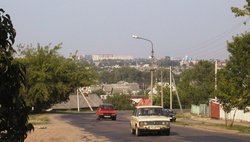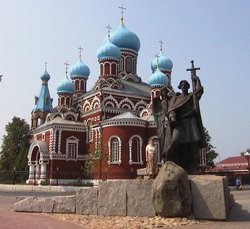Barysau
|
|
Barysau (Borisov) (Belarusian: Бары́саў; Russian: Бори́сов) (population 150,700 as of 1999) is a town in Belarus situated near the Berezina River. It was founded in 1102 by Polotsk prince Boris Vseslavovich. In 1812 Napoleon's troops were defeated while crossing the Berezina river (the bridge being destroyed in the process). In 1871, a railroad between Brest and Moscow under construction passed near Borisov, and a railroad station was built there. In 1900 the area around the station was annexed to Borisov. In November 1917 it became a part of the Soviet Union. From 1918 to 1920 it was occupied by German and then Polish soldiers; after they were evicted, the Belarusian Soviet Socialist Republic was established.
Borisov-view-from-window.jpg
During World War II, Borisov was again occupied by Germans from July 2, 1941, to July 1, 1944, and most of the city was destroyed and impoverished again. After the war Borisov became a major industrial center, and as of 2002 there are 41 large factories, whose goods are well-known across Russia, the CIS and abroad. The railroad is still an important artery, but now it is powered by overhead electric lines. Most enterprises are still owned and operated by the government; the current Belarusian president Lukashenko tries to discourage privatization.
As usual for this region, families live mostly in flats in large, modern apartment buildings, but there are some single-family homes on the outskirts, some of which do not yet have indoor plumbing. The water comes from an artesian well and is very clean and healthy.
External links
- Coat of Arms (http://txt.knihi.com/hierb/barys.gif)
- Photos on Radzima.org (http://radzima.org/pub/miesta.php?miesta_id1=mebabary)bg:Борисов


